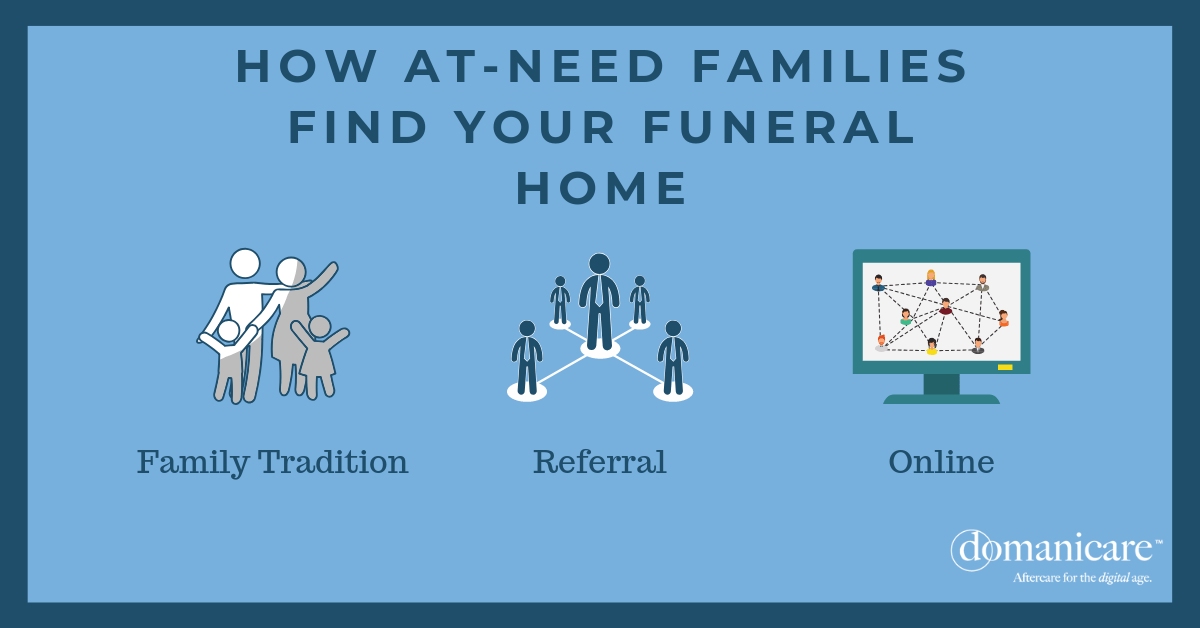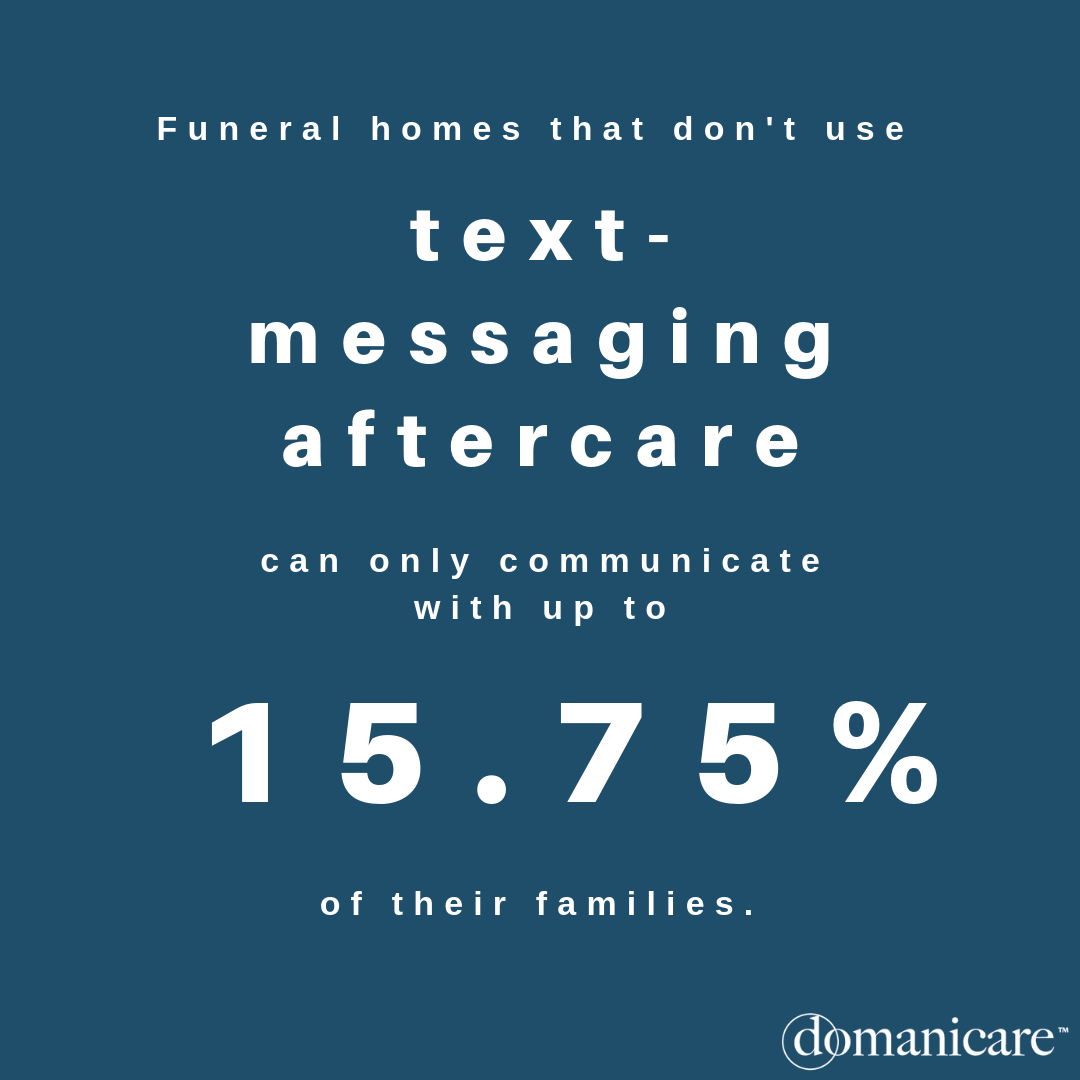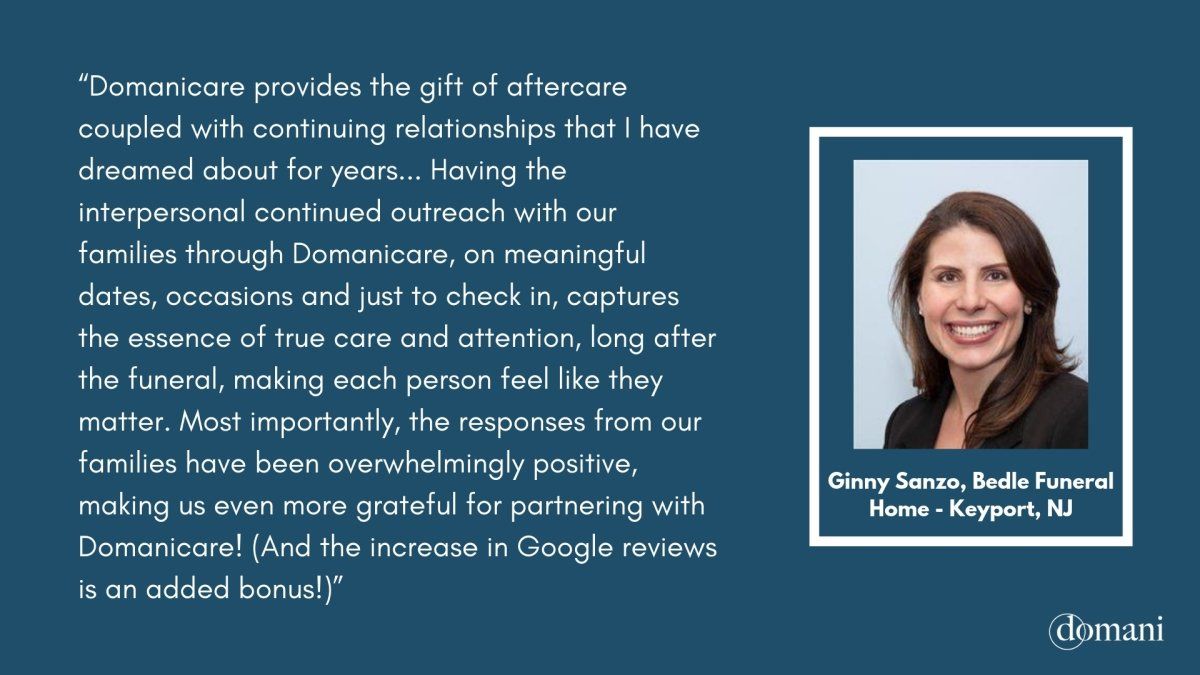Why Only 15.75% of Your Aftercare Families Can Leave Reviews
Jon Lefrandt • July 22, 2019
At-need families find your funeral home in one of three ways:
1. Family tradition
2. Referral
3. Online

Though some families still maintain the tradition of using the same funeral home for generations, finding a funeral home online is more popular than any other search method.
Families who move into a new home in a new town have no other resource than the web for finding a funeral home. And when a researching customer uses the web to find a funeral service, they rely on funeral home reviews to make a decision.
Positive funeral home reviews
are now more important than ever. In fact, 4 out of 5 people don’t shop around for a funeral home (NFDA Consumer Survey). They go with the first funeral home they call. That means that being #1 in Google is vital.
So how do you generate reviews for your funeral home?
More importantly, how do you generate POSITIVE reviews for your funeral home?
Great question. I’ll tell you, and I think it’s important for you to realize you aren’t the first person to ask this question!
Let’s begin.
Why Your Aftercare Families Can't Leave Reviews
First, it is important to understand that Google is on the consumer’s team.
It shows your funeral home in comparison to all other funeral homes in the local market and shows the satisfaction ratings of your funeral home in the form of customer reviews.
So imagine your funeral home is the highest rated funeral home in your local market, has 100 more 5-star reviews than your competition, and rakes in just 50% of the local funeral home search traffic each month — in major cities, that’s anywhere from 100 to 200 potential calls per month.
That would be great.
There’s just one problem:
And if you can only communicate with 15.75% of your families, you are only tapping into a fraction of the positive experiences your at-need families have had.
Studies show that funeral homes can only communicate with up to 15.75% of their aftercare families through any one of the traditional communication methods (email - 15.75% open rate, direct mail
- 1% return rate, phone calls
- 13% answer rate).
In other words, 84% of your aftercare families can’t leave reviews, because you aren’t communicating with them.
You can do better.
What you need is a communication method that is 1) fast, 2) personal, and 3) effective.
Text messaging is the perfect answer.
Aftercare communication through text messaging has proven to revolutionize the funeral aftercare profession.
If you use aftercare text messaging
the right way, you could boost the number of conversations you’re able to have with families by over 300%.
How to Get a 98% Read Rate and 45% Response Rate through Funeral Aftercare
When you use text messaging to contact your families through aftercare services, the vast majority respond within a few minutes with words of both gratitude and grief.
You should ask yourself what’s the best service you can provide to these grieving families.
How will you respond if they say they aren’t able to handle the loss? How will you respond if they ask for help? How can you maximize the amount of 5-star reviews you generate from aftercare families?
Your text messaging service should include:
- Live text responders: While you should certainly have an entire team helping respond to aftercare families, you should not resort to chatbots to contact families. This is about creating relationships, not exchanging blanket messages.
- Grief resources: Domanicare has found that 40 percent of aftercare families request grief and bereavement resources. Be ready to fulfill any need the family might request, whether it’s an additional death certificate, grief resources, or headstone recommendations.
- Brand Champion Identification: Your text responders should be trained to identify the families who’ve had the best experience with your funeral home. All of your brand champions should be selected and set aside until the time is right to request a review.
- Review Generation: Only ask for reviews from your brand champions and only ask them for reviews at the right time. How do you know what the right time is? Only ask for reviews after you’ve done everything you can to help the customer, the customer has no lingering needs, AND the customer has expressed gratitude. In other words, ask when you’ve already helped the aftercare family/individual overcome their needs.
Families are more likely to respond if they feel that the message they have received was sent out of care and respect. This is accomplished by reaching out to check-in and make sure they’re doing well. Your aftercare text messaging should include offers of help and support.
If the aftercare family requests bereavement resources, you should have a wide range of grief resources available to fit each individual’s unique situation.
Why Are Funeral Home Reviews So Difficult to Generate?
Funeral home owners are not the only ones to struggle with generating reviews, but the funeral profession does have additional roadblocks to generating reviews.
First of all, “funeral home customers” are families who’ve just lost a loved one. Asking for a review after a funeral is not only difficult, it’s incredibly awkward for the funeral home.
Requesting a customer review from aftercare families must be done at the right time and in the right way or it will be considered inappropriate.
Review generation also requires a high degree of dedication and commitment to staying organized. Not only must you have relationship-building conversations with aftercare families, but you must also track those conversations, reviews requested, and reviews generated.
Because the review generation process includes much more than just asking for the review (it involves aftercare communication, grief support, AND THEN review generation), it is a monumental task.
Most funeral homes either don’t do review generation correctly or they give up in frustration way before the “ask for review” phase.
What Tools Are There for Funeral Home Review Generation?
Besides Domanicare, there are a few aftercare text-messaging programs available. However, these tools have several fatal flaws.
The first of which is the fact that all other aftercare communication must be performed by the funeral home itself under the guise of “funeral homes get to control the message.” This adds a huge workload onto the shoulders of funeral home directors and owners and doesn’t end up helping the funeral home as much as advertised.
On the other hand, Domanicare live text responders are trained to provide the highest quality of help and support to aftercare families. As for messaging control, every funeral home owner has the power to alter aftercare messaging and receives a monthly transcript detailing every message and conversation.
Another flaw of third-rate aftercare services is the fact that their form of “review generation” is just a link or survey that redirects people to a review landing page. It is insincere, low-quality aftercare that fails to help families heal.
Domanicare was born after I noticed certain holes between the funeral homes and the families they serve through my own grief experience
— it was created to care for families AND help funeral homes generate reviews, not one or the other.
Aftercare for the Digital Age
Whether you choose to create your own text-messaging aftercare company that generates reviews, provides grief support, and allows for appointment setting or you’d rather hire a digital aftercare company, the important thing is that you do aftercare correctly.
Funeral homes should be helping families heal and move forward — it’s not only beneficial to the families, but it’s also beneficial to the funeral home.
Our aftercare families are ready and willing to leave reviews; they just need the right pathway.
And text-messaging based aftercare is the pathway that we’ve been waiting for.
Funeral Home Articles

If there's one thing we've learned in 2020, it's that it's difficult to predict the future, and there will all be surprises that lie ahead. Businesses and individuals need to stay agile and adaptable to be ready for whatever life throws at them. 2020 has been a challenging year for the funeral profession and others as well. Still, we've seen that those funeral homes and funeral professionals who have focused on making their consumer experience as comforting and easy as possible are those that are winning. At Domani, we exist to help funeral homes help their families have a better experience. Through the power of text messaging, we follow up with families and give them the support and resources they need following a loss. That great experience then leads to a positive online review and helps others looking for a positive experience to find that funeral home. It's a virtuous cycle that helps grow a funeral home's at-need business. When it comes to preneed, the same principle holds. If funeral homes can provide the experience a family is looking for, that will be the funeral home that wins. During 2020, our preneed appointment setting team has found great success in scheduling remote appointments. Funeral homes that have been willing to adapt and find new ways to do business have grown even during difficult circumstances. We firmly believe that technology will help us as a funeral profession provide those better experiences for families, but simply using technology for technology's sake is not the answer. We need to leverage technology to help provide personal, engaging experiences with families. We shouldn't use technology as a crutch or an excuse. It's another way to help the ones we serve and provide them the support they need during a difficult time. As we approach the end of the year and look forward to 2020, take some time to think about how your funeral home is providing meaningful experiences for families and how/what you can do to improve that in the coming year. If you're interested in learning more about Domanicare or Domani Appoinment Setting, please schedule a demo by clicking the link below.

By far the most effective way to create a sense of loyalty to your funeral home is to perform an exceptional service for that family. However, there’s more that you can be doing to establish credibility with families. Here’s three easy steps on how to develop loyalty to your company and ensure your customers come back for your services when a loved one passes.

The vast majority of people in the US and Canada use smartphones. Almost everyone has a smartphone nowadays. Remember when the first “smartphone” came out in 1992 and cell phones like the BlackBerry and iPhone were considered luxuries when they were first created? Now it’s a common sight to see an iPhone. Most funeral homes and cemeteries haven’t even scratched the surface of text-based aftercare, but with 80% of the U.S. population owning a smartphone, and that number expected to rapidly grow.

